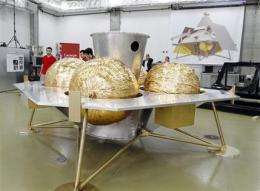Pa. robot institute attracts presidential visit

(AP) -- Need help defusing a bomb, mowing a lawn, or scraping old paint?
President Barack Obama might see robots that can do those tasks on Friday when he visits the National Robotics Engineering Center at Carnegie Mellon University. It's one of eight research centers at the school's Robotics Institute.
The institute has been a global force in robotics development over the last 30 years. Its scientists have created robot vehicles to scout out war zones, medical robots, entertainment robots and even the SnackBot, which ferries snacks to people so scientists can study how humans respond to machines.
With growing interest from the military, businesses and consumers, the institute has over 500 technical experts and a $65 million annual budget. And its scientists aren't just asking questions - they're building robots that ask questions, too.
Institute director Matthew Mason told The Associated Press that in the early days of robotics research the vision was for machines to do the dull, dirty or dangerous jobs that humans shun.
"But now we think not so much of a robot instead of a person, but of robotic technology working with people," Mason said. That could mean helping the elderly or sick cope with basic household tasks, or helping a doctor perform surgery.
For Manuela Veloso, a scientist at the institute, a key step was building robots that are aware they don't have all the answers.
"They know the bounds of their ability. If they are not confident, they stop," and then ask a human a question, she said.
Her robots also learn that some people in the office don't have the time or inclination to answer questions from a machine.
"The robot plans not only with a model of the environment, but a plan of the people in the environment," she said.
Veloso now has two of the new designs - called co-bots for collaboration - and like humans who gossip about the best path to success at work, the co-bots compare notes.
"The two robots exchange information when they learn about the humans, and they negotiate who should go where among the two of them," said Veloso, who is also president-elect of the Association for the Advancement of Artificial Intelligence.
She now sees robots - and artificial intelligence - in a completely new way.
"Forget about these robots knowing it all," she said. "I suddenly realized that intelligence was not about what you know. It was actually about knowing what you don't know."
Her next project is training the robots to go to the Internet for answers when humans can't provide them.

"I have a big vision of where we are going," Veloso said of her robots. "They know what they can do and what they cannot do. That's very beautiful."
Now the question may be how humans react to such new robots.
Mason, director of the institute, says that there's always been the issue of human trust in technology.
"For many years a lot of us were reluctant to get into medical robotics," he said, because of a fear that a robot mistake might cause harm to a patient, and thus tarnish the whole field.
But Mason thinks that the success of robots that identify and dispose of bombs in the Iraq and Afghanistan wars has helped change views.
"You can't look at the wreckage without feeling grateful" that no human life was lost, he said.
Large agricultural companies also are considering robotic harvesting because of potential migrant labor shortages, he said.
Obama will stress the theme of growing American jobs through high-tech manufacturing with the visit to Carnegie Mellon.
Some companies already have such job openings, and they struggle to find enough people with the right skills.
Roderick Herrick is vice president and site manager for Bayer Corp.'s industrial park in Baytown, Texas. It's a manufacturing plant that uses advanced techniques. Jobs there can pay well - around $60,000 a year - and have the opportunity for advancement.
"The challenge is really whether we can find the talent," Herrick said. "Manufacturing has kind of gotten a black eye over the years."
©2011 The Associated Press. All rights reserved. This material may not be published, broadcast, rewritten or redistributed.


















